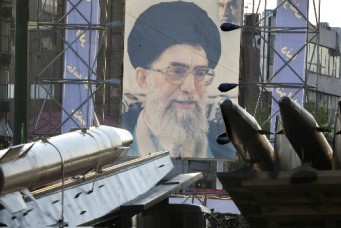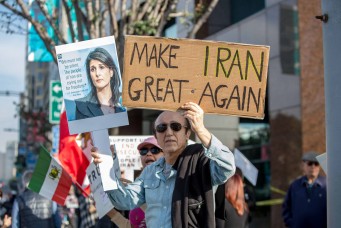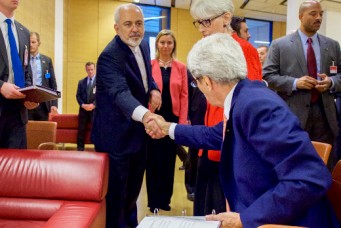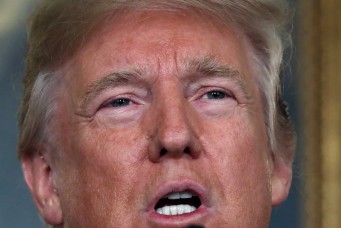An Iran Strategy Worth Fighting For
U.S. and Saudi confrontations with Iran are causing proxy-warfare in weak or failing Arab states and escalating tensions in the Gulf, but there might still be a chance for diplomatic progress with the right combination of measures targeting Gulf-specific, regional, and international issues.

Seaman Apprentice William Crismon, from Corpus Christi, Texas, scans the horizon during his watch aboard the U.S. Navy Arleigh Burke-class guided-missile destroyer USS Bainbridge in the Arabian Gulf July 19, 2019. Jason Waite/Reuters
On June 20, 2019, Iran shot down a U.S. surveillance drone which it claims violated Iranian airspace. This incident is just one of the latest escalations by Iranian military forces in response to bellicose rhetoric from the Donald Trump administration. Indeed, President Trump has already said he was “cocked and loaded” to strike Iran on the very next day, but managed to pull back only in the last ten minutes. An eleventh-hour decision to call off the attack probably came from the realization such a move could spark an escalation in military confrontation between the two sides and draw in other actors. Instead, the United States responded with cyber attacks against Iranian military computer systems and more recently by shooting down an Iranian drone, which it claimed came within 900m of is vessels in international waters.
This only adds to a growing list of tensions between Iran and the United States dating back to June 2013, when it became apparent that there was an expanded and entrenched presence of the Islamic Revolutionary Guard Corps (IRGC) in Syria that also constituted a major threat to Israeli national security. In May 2017, the Middle East Strategic Alliance, or MESA, was created, not only to assist in scaling back the U.S. security posture in the Middle East, but also to allow the states of the Gulf Cooperation Council (GCC), Egypt (which would leave following uncertainties about the future of the alliance), and Jordan to counter Iran without U.S. intervention.
Trump would deal the biggest blow to American–Iranian relations with his decision to withdraw from the Joint Comprehensive Plan of Action (JCPOA) on May 8, 2018, citing it as a bad deal. On the fortieth anniversary of the Iranian revolution in February 2019, Trump and his National Security Advisor John Bolton both tweeted about the Iranian regime’s “40 years of failure.”
The major concern here is that an irresponsible policy misstep from Iran, the United States, or its allies in the region such as Saudi Arabia could trigger a military confrontation, which would draw in other regional state and non-state actors. Already, there have been a number of proxy attacks reported in regional countries, signaling that a broader U.S.–Iranian confrontation is likely. For example, on May 12 “sabotage attacks” were reported on oil tankers off the United Arab Emirates coast. A drone strike followed on May 14 at two Saudi oil pumping stations. In response, on May 16, one Saudi newspaper called for “surgical strikes” against Iran, citing the U.S. response to the use of chemical weapons in Syria as a precedent for such a strike.
The United States responded by sending a thousand more military personnel to the Middle East and deploying the USS Abraham Lincoln and a contingent of Navy destroyers. The Trump administration has, over time, also extended an economic war against Iran through extensive sanctions, with Iran’s Foreign Minister Mohammad Zarif stating on June 11 that those conducting them should not expect to remain safe.
Many policymakers, analysts, and scholars point to internal and external sectarian politics as part of the reason why diplomatic solutions have been difficult to achieve. This has been exacerbated by the Saudi and Iranian leaderships, which have sought to shift the balance of power in the Middle East in their favor after the 2010–11 Arab uprisings. As Saudi Arabia is focused on building up conventional military capabilities, Iran vies to build a proxy network—evidenced in Syria and by its support for the Houthis in Yemen. Even in Sudan, there are indicators of this wider competition, which means that each actor generally views the other as a protagonist in a zero-sum game.
However, many issues and contentions concerning Iran are political rather than sectarian and require the will of the United States to draw down its involvement in Middle Eastern affairs—not necessarily by creating new divisive military alliances such as MESA, but in negotiating more inclusive indigenous security structures.
A body could be designed to resolve critical tensions in the security and political spheres similar to the Organization for Security and Co-operation in Europe (OSCE). Whilst negotiating its leadership, financial contributions, and policy approach could be a challenge, it could also prove to be a game changer in terms of restoring a sense of conflict resolution to states experiencing proxy warfare, as well as stabilizing the balance of power in the region.
Now may also be the right time for diplomacy because the costs of a future war are becoming increasingly evident to both sides. The centralized decision-making in the House of Saud and in Iranian policy circles could use more out-of-the-box thinking and track II initiatives designed to bridge core differences. There may also be a game changer afoot in Tehran, whereby some scholars such as Ray Takeyh believe that Iran is merely sabre-rattling before returning to the negotiating table. The United States may have less leverage now than when it was fully deployed in Iraq and Afghanistan, but a renewed attempt at honest diplomacy could deliver some reciprocity. With better U.S.–Iranian relations, a myriad of negotiations could be explored concerning an enhanced nuclear deal or at least making sure Iran stops its nuclear enrichment activity. It might lead to a new deal regarding Iranian ballistic missiles and the subversive behavior of the IRGC. This could enhance prospects for regional security, especially in Syria, Israel, Palestine, and Iraq. Iran would benefit through various confidence-building measures offered in response, which would address both its economic situation and its sense of chronic insecurity.
European powers could play a major role in keeping the JCPOA on track. By putting an end to U.S.-led economic warfare and building up a wider and more effective diplomatic process, Europe can help foster a climate of cooperation. Furthermore, clearing old debts—a strategy the British government is pursuing with regards to Iran through the case of imprisoned Iranian-British woman Nazanin Zaghari-Ratcliffe—could enhance the sense of old scores having been settled.
The United States and Iran remain open to negotiation in theory, with President Trump stating that there should be no preconditions to starting talks. With both sides in face-saving mode, having an intermediary or pursuing further secret direct talks will be the best way to guarantee a phased policy U-turn to avoid war, provided potential spoilers are kept at bay.
Robert Mason is associate professor and director of the Middle East Studies Center at the American University in Cairo. He is author of Foreign Policy in Iran and Saudi Arabia: Economics and Diplomacy in the Middle East. On Twitter: @Dr_Robert_Mason.
Read More



